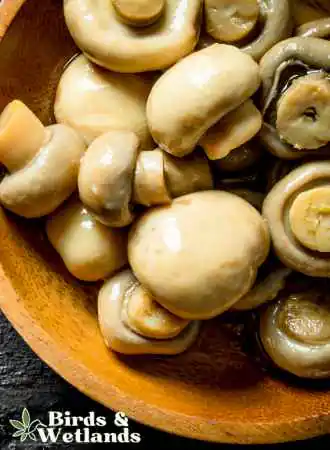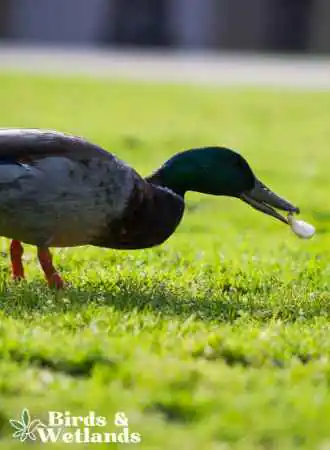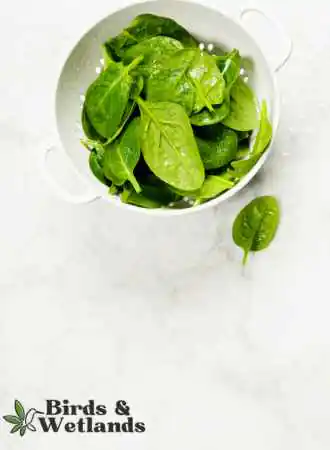Mushrooms are a delicious and nutritious food enjoyed by many, but as a duck owner, you may be wondering whether they’re safe to feed to your feathered friends.
While ducks have a varied and omnivorous diet, it’s important to be aware of any potential risks or concerns when offering new foods.
Can ducks eat mushrooms?
Feeding ducks mushrooms is not recommended, as some varieties can be toxic to birds, including ducks. It can be difficult to distinguish between safe and toxic mushroom varieties, so it is best to avoid offering them altogether.
Key Takeaways on Feeding Ducks Mushrooms
- Mushrooms are high in fiber and packed with important vitamins and minerals. They are also a good source of protein, making them a filling and satisfying food for your duck.
- Restrict mushroom feeding to edible species only, remember that not all mushroom varieties are safe for ducks.
- It is better nutritionally to feed ducks cooked mushrooms rather than raw ones.
Can Ducks Eat Cooked Mushrooms?

Cooked mushrooms are safe for ducks to eat, but there are a few things to keep in mind.
Be sure that the mushrooms don’t contain any salt or other additives. Too much salt can be bad for ducks, and can even cause them to lay thin-shelled eggs.
Cooked mushrooms should only be given as an occasional treat. Ducks need a varied diet of vegetables, fruits, grains, plant material and insects. A few cooked mushrooms now and then won’t hurt them. While cooked mushrooms are fine for ducks to eat, they should only be offered in moderation.
Can Ducks Eat Raw Mushrooms?
Ducks can technically eat raw mushrooms, but it is not the best option for them. Cooked mushrooms are easier for ducks to digest, and this reduces the risk of them suffering from any digestive problems. In addition, cooking the mushrooms helps to break down any harmful toxins or bacteria that might be present.
While most ducks will be fine if they eat the occasional raw mushroom, it is generally better to err on the side of caution and cook them first. This will help to ensure that your ducks stay healthy and happy.
Can Ducks Eat Canned Mushrooms?

While it may seem harmless to feed a duck a few canned mushrooms, it is actually not recommended. Canned mushrooms are high in salt and preservatives, which can be harmful to ducks. In addition, canned mushrooms often contain chemicals that are used to prolong their shelf life. These chemicals can also be toxic to ducks. It is best to avoid feeding canned mushrooms to ducks.
Can Baby Ducks Eat Mushrooms?
Baby ducks can eat mushrooms four weeks after they hatch. The mushrooms should be finely diced and mixed with other duck feed, such as pellets or crumbles. You can also add them to the ducklings’ water bowl. Young ducks need a lot of nutrients to grow, and mushroom treats are a good source of vitamins and minerals. They also contain antioxidants, which can help to boost immunity.
Can Ducks Eat Wild Mushrooms?
Ducks can eat wild mushrooms. As long as the mushroom is not poisonous, it is safe for the duck to eat. In fact, many wild ducks enjoy eating mushrooms. T
he best way to ensure that your duck does not eat a poisonous mushroom is to only allow them to forage in areas where you know there are safe mushrooms. This way, you can be sure that your duck will only be eating food that is safe for them to consume.
Not all mushrooms are edible, so it is important that you do your research before allowing your duck to eat any wild mushrooms. Ducks are known to be particularly fond of certain types of edible mushrooms, so if you find some growing in your area, it is likely that your duck will enjoy eating them.
What Are the Nutritional and Health Benefits of Feeding Mushrooms to Ducks?

Ducks are omnivorous creatures, meaning that they will eat both plants and animals as part of their diet. This diet helps to keep them healthy and provides them with the nutrients they need to grow and thrive. One type of food that is good for duck’s health is mushrooms.
When you feed ducks mushrooms, they can take advantage of a good protein source. Protein is essential for healthy growth, egg production and feather development.
Most mushrooms also contain fiber, which helps to keep the duck’s digestive system running smoothly. Additionally, mushrooms are a good source of niacin, an essential nutrient for proper bone growth and development in ducklings, particularly their walking abilities. They also contain Vitamin D which is important for better calcium absorption.
Finally, cultivated mushrooms contain vitamin C which boosts the immune system, formation of red blood cells and accelerates healing. As you can see, there are many health and nutritional benefits to feeding mushrooms to ducks.
| Protein | 3.1 g |
| Fiber | 1 g |
| Niacin | 3.6 mg |
| Vitamin D | 0.2 mcg |
| Vitamin C | 2.1 mg |
| Carbohydrates | 3.3 g |
| Fat | 0.3 g |
| Calories | 22 |
| Water | 92.4 g |
What Mushrooms Are Edible for Ducks?

Here are a few mushrooms that are available in most grocery stores:
Chanterelle mushrooms
White button mushrooms
Shitake mushrooms
Porcini mushrooms
Morel mushrooms
Portobello mushrooms
Cremini mushrooms
Oyster mushrooms
Porcini mushrooms
Reishi mushrooms
White mushrooms
Black trumpet mushrooms
The general rule of thumb is that all mushrooms safe for humans are also safe for ducks. So, feed ducks mushrooms you bought from the grocery store.
What Mushrooms Are Not Edible for Ducks?
Avoid feeding ducks with the poisonous mushrooms below:
Death Cap
Conocybe filaria
Webcaps
Autumn Skullcap
Destroying Angels
Deadly Dapperling
Here are a few characteristics that are common with poisonous mushrooms:
presence of white gills
a ring on the stem
bulbous sack
How to Serve Mushrooms for Ducks
If you’re planning on adding mushrooms to your duck’s diet, cooking mushrooms is the best way to go. Ducks eat mushrooms, even raw. But it would be easier for them to digest the mushroom if they were cooked.
You can also feed your ducks with frozen mushrooms. Make sure to thaw them first and chop them into smaller pieces. A whole mushroom can be a choking hazard.
Duck owners can also boil mushrooms. Ducks like their soft texture.
Feed your ducks mushrooms that have been chopped into tiny pieces.
Let the mushrooms cool down before serving them.
Feed mushrooms in moderation even though they’re nutritious.
Don’t feed mushrooms you don’t recognize to your ducks.
Supplement mushrooms to your ducks with other foods such as duck feed, sunflower seeds, and plenty of leafy greens such as chopped lettuce and insects.
Avoid mixing mushrooms with foods that are considered harmful such as citrus fruits, bread and moldy food.
Similar Duck Foods

| Algae | Do Ducks Consume Algae? |
| Lettuce | Is Lettuce a Healthy Option for Ducks? |
| Spinach | Can Ducks Enjoy Spinach? |
| Cabbage | Are Ducks Able to Eat Cabbage? |
| Cauliflower | Can Ducks Eat Cauliflower? |
Best Duck Feed Pellets
Are you a duck owner looking for the perfect feed to keep your feathered friends happy and healthy? Look no further than Purina Duck Feed Pellets! With their nutritionally balanced formula and high-quality ingredients, these pellets are the ultimate solution for providing your ducks with the nutrition they need to thrive.
Pros
- Complete Nutrition: Purina Duck Feed Pellets are nutritionally balanced to provide all the essential vitamins and minerals that ducks need to stay healthy and strong.
- Easy to Digest: The pellets are specially formulated to be easy to digest, which makes them ideal for ducks of all ages.
- Promotes Growth and Development: With its balanced nutrition formula, Purina Duck Feed Pellets are designed to support healthy growth and development in ducks.
- Suitable for All Breeds: Whether you have domestic ducks or wild ducks, Purina Duck Feed Pellets are suitable for all breeds of ducks.
- Trusted Quality: Purina has been producing high-quality animal feed for over 100 years, so you can trust that your ducks are getting the best possible nutrition with Purina Duck Feed Pellets.
Cons
- Cost: Compared to other types of duck feed on the market, Purina Duck Feed Pellets can be slightly more expensive. However, many customers feel that the high-quality ingredients and balanced nutrition formula are worth the extra investment.
- Pellet Size: Some customers have noted that the pellet size of Purina Duck Feed Pellets can be quite large, which may not be suitable for smaller or younger ducks. However, many customers have reported that the pellets can easily be broken up or soaked in water to make them easier to eat.



